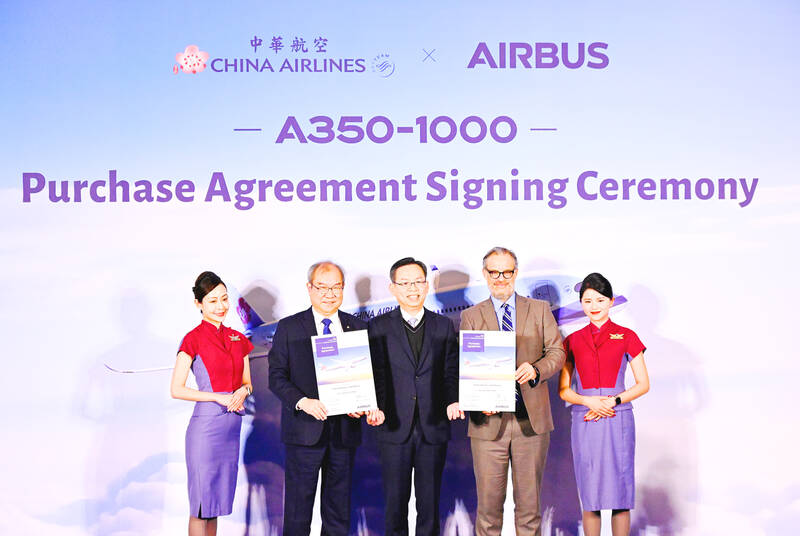China Airlines Ltd (CAL, 中華航空) has finalized an agreement with Airbus SE to buy 10 A350-1000 passenger aircraft, which the carrier plans to fly as its next flagship model on high-demand, long-haul routes.
CAL chairman Kao Shing-hwang (高星潢) and Airbus executive vice president for commercial aircraft sales Benoit de Saint-Exupery signed the deal yesterday at the carrier’s corporate headquarters at Taiwan Taoyuan International Airport.
CAL expects to take delivery of the 10 A350-1000 aircraft in 2029, the airline said in a statement. It will be a new model in its fleet and be used on high-demand routes to European and North American designations, including London and New York, it said.

Photo: Chu Pei-hsiung, Taipei Times
CAL said it also has an option to purchase five more A350-1000s, while the 15 A350-900s currently in its fleet will undergo a cabin upgrade starting in 2027.
Meanwhile, Kao told reporters at the signing ceremony that CAL is set to see its current fleet of 83 aircraft further expand to 90-95.
Nine more A321s will be delivered slightly behind schedule, and Boeing Co is set to ship CAL’s first B787 jet between late this year and early next year.
He also offered a positive outlook for CAL this year after it posted record revenue and net profit for last year, forecasting that the total number of passengers the carrier carries this year will exceed the level recorded in 2019, the last year before the COVID-19 pandemic hit.
According to Kao, the Asia-Pacific aviation market is still expected to see double-digit percentage growth, but ticket fares are not expected to drop, because of the high cost of sustainable aviation fuel.

Merida Industry Co (美利達) has seen signs of recovery in the US and European markets this year, as customers are gradually depleting their inventories, the bicycle maker told shareholders yesterday. Given robust growth in new orders at its Taiwanese factory, coupled with its subsidiaries’ improving performance, Merida said it remains confident about the bicycle market’s prospects and expects steady growth in its core business this year. CAUTION ON CHINA However, the company must handle the Chinese market with great caution, as sales of road bikes there have declined significantly, affecting its revenue and profitability, Merida said in a statement, adding that it would

i Gasoline and diesel prices at fuel stations are this week to rise NT$0.1 per liter, as tensions in the Middle East pushed crude oil prices higher last week, CPC Corp, Taiwan (台灣中油) and Formosa Petrochemical Corp (台塑石化) said yesterday. International crude oil prices last week rose for the third consecutive week due to an escalating conflict between Israel and Iran, as the market is concerned that the situation in the Middle East might affect crude oil supply, CPC and Formosa said in separate statements. Front-month Brent crude oil futures — the international oil benchmark — rose 3.75 percent to settle at US$77.01

RISING: Strong exports, and life insurance companies’ efforts to manage currency risks indicates the NT dollar would eventually pass the 29 level, an expert said The New Taiwan dollar yesterday rallied to its strongest in three years amid inflows to the nation’s stock market and broad-based weakness in the US dollar. Exporter sales of the US currency and a repatriation of funds from local asset managers also played a role, said two traders, who asked not to be identified as they were not authorized to speak publicly. State-owned banks were seen buying the greenback yesterday, but only at a moderate scale, the traders said. The local currency gained 0.77 percent, outperforming almost all of its Asian peers, to close at NT$29.165 per US dollar in Taipei trading yesterday. The

RECORD LOW: Global firms’ increased inventories, tariff disputes not yet impacting Taiwan and new graduates not yet entering the market contributed to the decrease Taiwan’s unemployment rate last month dropped to 3.3 percent, the lowest for the month in 25 years, as strong exports and resilient domestic demand boosted hiring across various sectors, the Directorate-General of Budget, Accounting and Statistics (DGBAS) said yesterday. After seasonal adjustments, the jobless rate eased to 3.34 percent, the best performance in 24 years, suggesting a stable labor market, although a mild increase is expected with the graduation season from this month through August, the statistics agency said. “Potential shocks from tariff disputes between the US and China have yet to affect Taiwan’s job market,” Census Department Deputy Director Tan Wen-ling